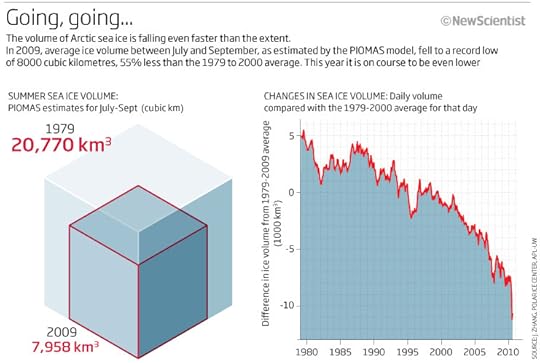Joseph J. Romm's Blog, page 1114
August 28, 2010
Arctic sea ice volume heads toward record low as Northwest Passage melts free fourth year in a row - Masters rebukes disinformers: "Diminishing the importance of Arctic sea ice loss by calling attention to Antarctic sea ice gain is like telling someone to
Chris Mooney has a good piece in New Scientist, "Arctic ice: Less than meets the eye," the source of the above figures. Mooney focuses on the work of Canada's David Barber — you can find his peer-reviewed work here: "Where on Earth is it unusually warm? Greenland and the Arctic Ocean, which is full of rotten ice" — New study supports finding that "the amount of [multi-year:] sea ice in the northern hemisphere was the lowest on record in 2009."
Mooney also discusses the PIOMAS ice volume ...
Arctic sea ice volume heads toward record low as Northwest Passage melts free fourth year in a row - Masters rebukes disinformers: "Diminishing the importance of Arctic sea ice loss by calling attention to Antarctic sea ice gain is like telling someone to
Chris Mooney has a good piece in New Scientist, "Arctic ice: Less than meets the eye," the source of the above figures. Mooney focuses on the work of Canada's David Barber — you can find his peer-reviewed work here: "Where on Earth is it unusually warm? Greenland and the Arctic Ocean, which is full of rotten ice" — New study supports finding that "the amount of [multi-year:] sea ice in the northern hemisphere was the lowest on record in 2009."
Mooney also discusses the PIOMAS ice volume ...
Arctic sea ice volume heads toward record low as Northwest Passage melts free fourth year in a row - Masters rebukes disinformers: "Diminishing the importance of Arctic sea ice loss by calling attention to Antarctic sea ice gain is like telling someone to
Chris Mooney has a good piece in New Scientist, "Arctic ice: Less than meets the eye," the source of the above figures. Mooney focuses on the work of Canada's David Barber — you can find his peer-reviewed work here: "Where on Earth is it unusually warm? Greenland and the Arctic Ocean, which is full of rotten ice" — New study supports finding that "the amount of [multi-year:] sea ice in the northern hemisphere was the lowest on record in 2009."
Mooney also discusses the PIOMAS ice volume ...
Arctic sea ice volume heads toward record low as Northwest Passage melts free fourth year in a row - Masters rebukes disinformers: "Diminishing the importance of Arctic sea ice loss by calling attention to Antarctic sea ice gain is like telling someone to
Chris Mooney has a good piece in New Scientist, "Arctic ice: Less than meets the eye," the source of the above figures. Mooney focuses on the work of Canada's David Barber — you can find his peer-reviewed work here: "Where on Earth is it unusually warm? Greenland and the Arctic Ocean, which is full of rotten ice" — New study supports finding that "the amount of [multi-year:] sea ice in the northern hemisphere was the lowest on record in 2009."
Mooney also discusses the PIOMAS ice volume ...
August 27, 2010
Real adaptation is as politically tough as real mitigation, but much more expensive and not as effective in reducing future misery - Rhetorical adaptation, however, is a political winner. Too bad it means preventable suffering for billions.
We basically have three choices: mitigation, adaptation and suffering. We're going to do some of each. The question is what the mix is going to be. The more mitigation we do, the less adaptation will be required and the less suffering there will be.
That's the pithiest expression I've seen on the subject of adaptation, via John Holdren, now science advisor. Sometimes he uses "misery," rather than "suffering."
I'm going to start a multipart series on adaptation — in honor of the fifth...
Real adaptation is as politically tough as real mitigation, but much more expensive and not as vital. - Rhetorical adaptation, however, is a political winner. Too bad it means preventable misery for billions.
We basically have three choices: mitigation, adaptation and suffering. We're going to do some of each. The question is what the mix is going to be. The more mitigation we do, the less adaptation will be required and the less suffering there will be.
That's the pithiest expression I've seen on the subject of adaptation, via John Holdren, now science advisor. Sometimes he uses "misery," rather than "suffering."
I'm going to start a multipart series on adaptation — in honor of the fifth...
Energy and Global Warming News for August 27th: Russia counts the costs of drought and wildfires; Your exhaust pipe could generate electricity; Peak wheat?
Russia counts the cost of drought and wildfires
The extreme heatwave, which caused a severe drought and wildfires in Russia, might be over, but both officials and consumers are now busy calculating its cost and trying to work out its consequences.
Russian deputy economy minister, Andrei Klepach, said earlier this week that the drought would take up to 0.8% off this year's economic growth, "or maybe even more than that".
The 0.8% official figure equals 313bn roubles ($10.1bn, £6.6bn at the...
The "Earth is carbon starved" crock
Our favorite climate de-crocker, Peter Sinclair has a new video that is particularly terrifying:
Related Post:
In must-see AGU video, Richard Alley explains "The Biggest Control Knob: Carbon Dioxide in Earth's Climate History"
TP's Lee Fang discusses the 'Kochtopus' network on Countdown
Last week I reported on the New Yorker's exposé on the Koch brothers, including their greenwashing and whitewashing Smithsonian exhibit. Now meet the terrific CAP researcher behind the story:
For the past two years, ThinkProgress researcher Lee Fang has been digging into the nefarious activities of the Koch family, reporting on their funding of the tea parties, the depth of their astroturfing, and their family's record of right-wing radicalism.
Using a great deal of TP's research, The New...
The Coming Food Crisis: Global food security is stretched to the breaking point, and Russia's fires and Pakistan's floods are making a bad situation worse. - Podesta, Caldwell: "Lasting gains in agricultural productivity will require ... action to confro
Prices of basic foodstuffs like buckwheat and flour have soared in Russia over the past month as the effects of its worst ever drought hit supplies, statistics showed Wednesday….
Most alarmingly, the price of Russian staple buckwheat — enjoyed by generations for breakfast or as an accompaniment to meat — rose a very sharp 8.6 percent in the space of the week.
So Seed Daily reported Wednesday. Last year, Lester Brown and Scientific American asked "Could Food Shortages Bring Down...
Joseph J. Romm's Blog
- Joseph J. Romm's profile
- 10 followers




